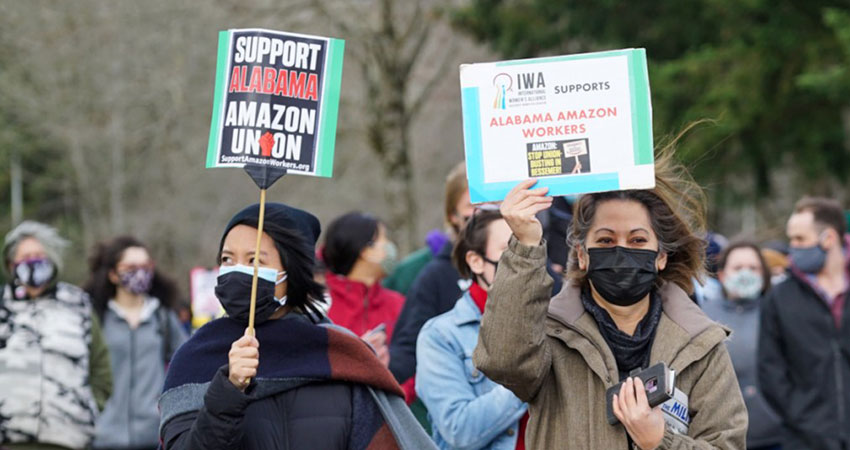Protesters in Seattle. Photo credit: Susan Fried, South Seattle Emerald
The union that was unsuccessful in its effort to organize workers at an Amazon fulfillment center in Alabama immediately challenged the April 9 outcome as expected, claiming the ecommerce giant illegally interfered with the election.
The Retail, Wholesale and Department Store Union said it was filing the complaint with the National Labor Relations Board, asking the NLRB to investigate Amazon’s tactics in order to force a new vote.
Less than 30% of the eligible workers voted for the union, handing Amazon a major victory against organized labor. Those voting no cited concerns about job security, union dues and the two-year-old facility being shut down by Amazon if it became a union shop.
“The employer created an atmosphere of confusion, coercion and/or fear of reprisals and thus interfered with the employees’ freedom of choice,” said Stuart Appelbaum, president of the RWDSU in a statement. “We will also present evidence to the Regional Director (of the NLRB) supporting the issuance of an unfair labor practices complaint against Amazon for unlawfully interfering with the protected right of employees to engage in union activity.”
Appelbaum noted a number of tactics by Amazon the RWDSU alleges were designed to thwart the union effort, including requiring workers to attend “lectures” that were “filled with lies and mistruths.”
“That’s why they flooded the internet, the airwaves and social media with ads spreading misinformation,” Appelbaum said. “That’s why they brought in dozens of outsiders and union-busters to walk the floor of the warehouse. That’s why they bombarded people with signs throughout the facility and with text messages and calls at home. And that’s why they have been lying about union dues in a right-to-work state.”
During the campaign, Amazon continually emphasized its starting pay of more than $15 an hour, double the minimum wage in Alabama, as well as benefits including full health, dental and vision, a 50% 401(k) match and training and continuing education. It also denied the union’s claim that it lied to employees when making the case against organizing, expressing a willingness to talk to elected officials about wages and working conditions.
The election was seen as a major bellwether for the future of organized labor in the U.S. As of last year, just 10.8% of workers here belonged to a union, according to the Labor Department, from a high of 38.4% in 1954. This is one of the lowest rates in the world, well behind countries like Iceland (90%), Denmark (67%), Canada (28%) and Germany (17%), according to the International Labor Organization.
Last week, the NLRB said Amazon wrongfully terminated two tech workers for speaking out publicly about working conditions in its hundreds of fulfillment and sortation centers, which of course the company denies.

